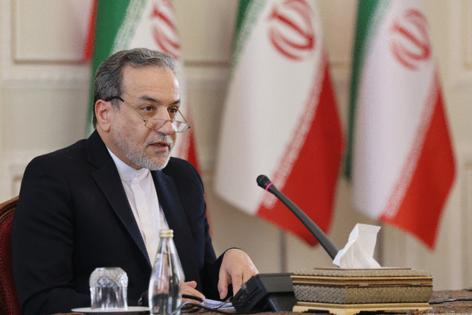US-Iran nuclear talks signal progress, next round in Europe
Published in Political News
The U.S. and Iran reported signs of progress in talks on a deal over Iran’s nuclear program after what the Iranian foreign minister described as increasingly detailed discussions.
A senior U.S. administration official said the third round of talks since President Donald Trump’s return to the White House was positive and productive, and the two sides agreed to meet again soon in Europe. Readouts from both sides indicated that substantial work remains to be done.
Oman’s Foreign Minister Badr Albusaidi, whose country is facilitating the talks, said in a post on X that “core principles, objectives and technical concerns were all addressed” in the latest discussions.
“This round of negotiations was much more serious than before,” Iranian Foreign Minister Abbas Araghchi told state television after the talks in Oman’s capital, Muscat. “We gradually entered more detailed, technical discussions.”
Economic, banking, and nuclear experts were involved in talks focused on building trust around Tehran’s nuclear program, safeguarding Iran’s right to the peaceful use of nuclear energy, and securing relief from sanctions, Iranian Foreign Ministry spokesman Esmaeil Baghaei said earlier.
Araghchi, who leads Iran’s negotiating team opposite his U.S. counterpart Steve Witkoff, cautioned that key differences remain.
“Sometimes willpower alone isn’t enough, and the differences may be so serious that an agreement can’t be reached,” he said. “Determination alone doesn’t guarantee success.”
The U.S. official said that while there is still much to do, further progress was made on getting to a deal.
Trump has pledged he won’t allow Iran to develop or obtain nuclear weapons, seeking to negotiate a new agreement to replace the 2015 nuclear deal from which he withdrew the US during his first term.
Iran says its nuclear program is peaceful while maintaining that its ability to enrich uranium is non-negotiable.
In a Time interview published Friday, Trump said Israel could decide for itself whether to strike Iranian nuclear facilities, though his administration could “make a deal without the attack,” noting he’d “much prefer a deal than bombs being dropped.”
Trump also said he’d be open to meeting Iran’s president or its Supreme Leader, Ayatollah Ali Khamenei, to whom he wrote last month urging negotiations on a new agreement.
On Wednesday, Araghchi said the talks were on the “right track” and that he was “cautiously optimistic.” A good deal could be reached if the U.S. avoided “unrealistic and impossible demands,” he said.
©2025 Bloomberg L.P. Visit bloomberg.com. Distributed by Tribune Content Agency, LLC.




























































Comments